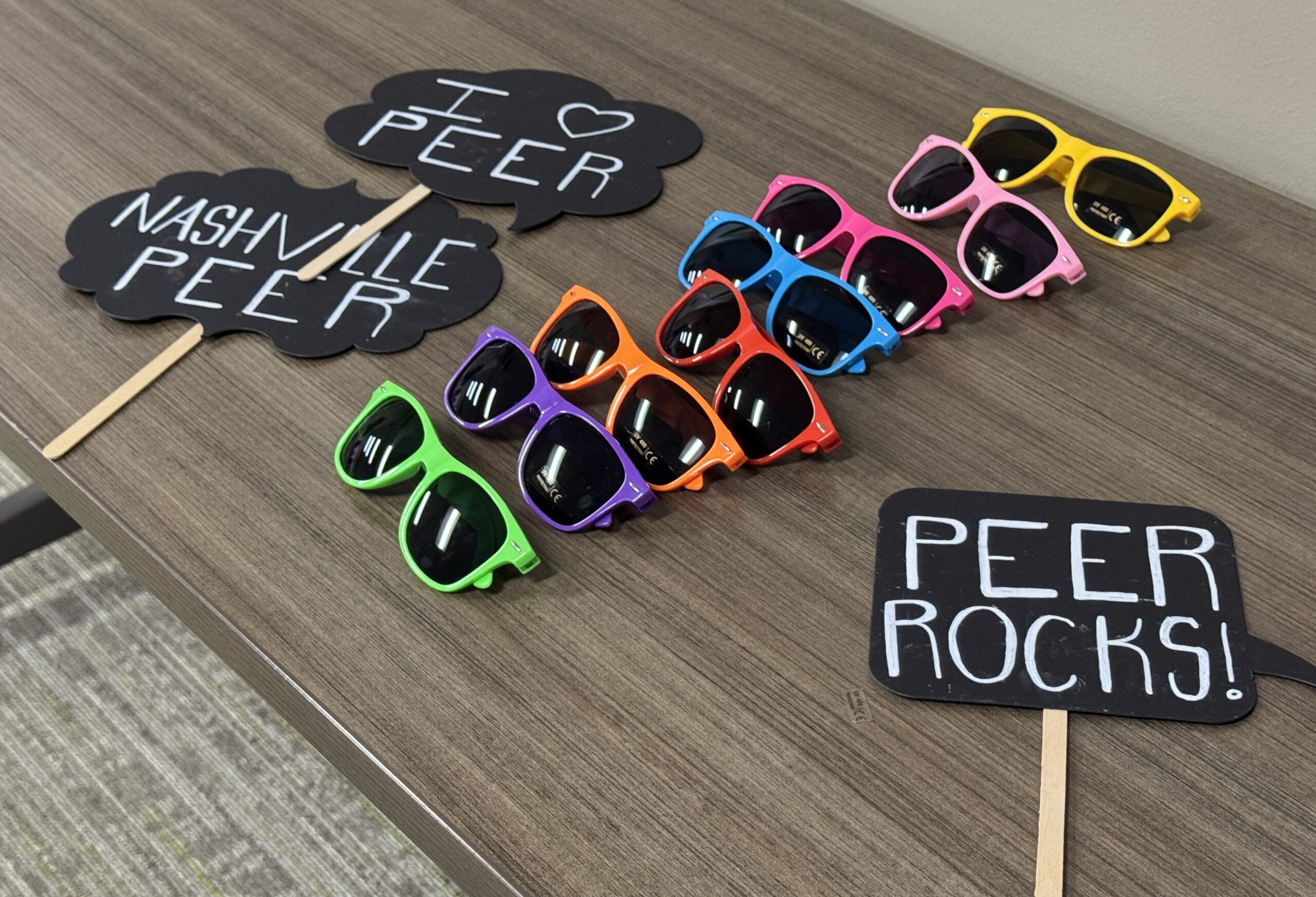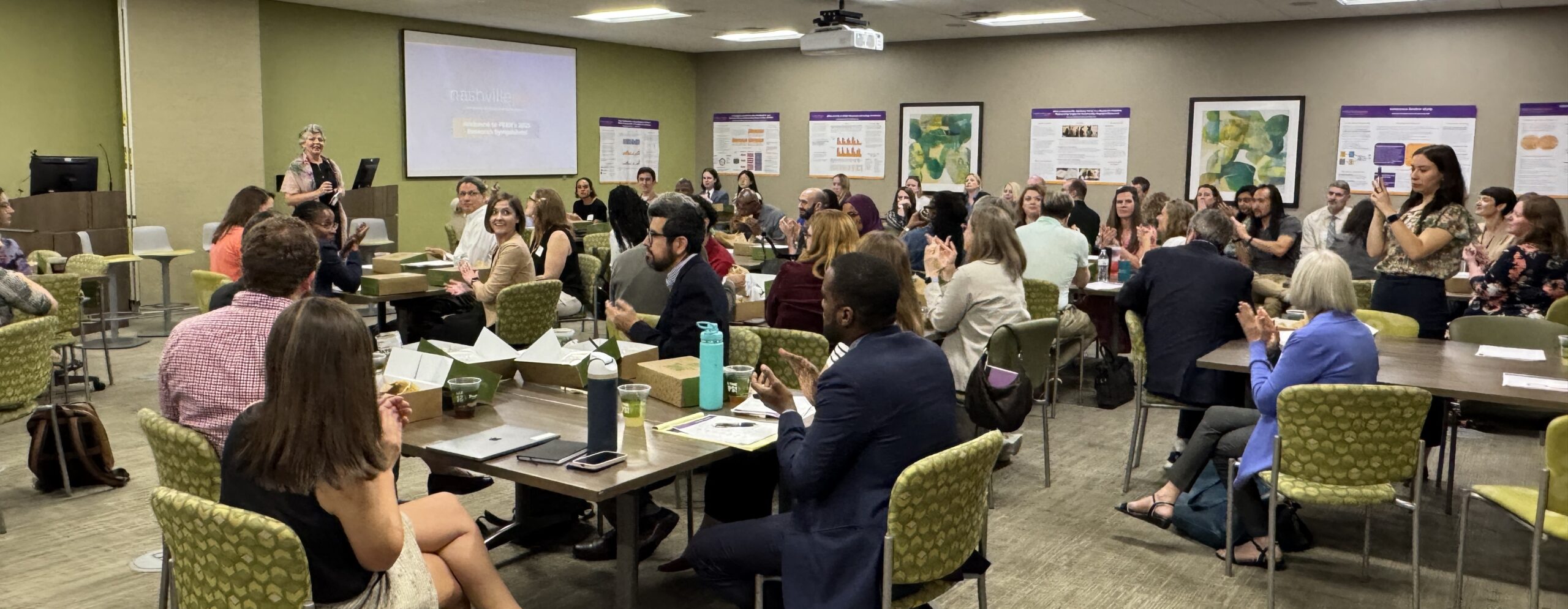Engage with Us
We want you to learn more about what we do and why we do it. We invite you to sign up to receive updates to learn how you be part of our work.

April 30th, 2025 – This spring, NashvillePeer held its second annual research symposium at the MNPS Employee Wellness Center. The event welcomed over 75 participants, including Vanderbilt faculty, MNPS staff and school board members, and community leaders to explore ongoing research from PEER’s Working Groups and rapid response studies through detailed project poster presentations.
Kicking off the Symposium, the MNPS Director of Schools, Dr. Adrienne Battle, and the Dean of Peabody College, Dr. Camilla Benbow provided opening remarks.
“Peer is not just producing research – it’s cultivating a partnership where learning is the work. It’s building the capacity to reflect, learn, and act across all layers of the district, ” said Battle, reflecting on the partnership’s impact to date.
Benbow added, “the research agenda set by Peer helps to ensure that our local investigations address the most pressing questions. Peer’s orientation towards the needs of practitioners means that we ask the right questions, that the questions are rightly phrased to produce usable results.”
Two small panel discussions also focused on pressing questions facing NashvillePeer and strategies for addressing key challenges in its collaborative work. The panel discussions covered pertinent issues facing Research Practice Partnerships, such as how to advance the field in uncertain times and how to accelerate change outside of the partnership.
Key insights from the panels include:

Strengthening Pathways to Postsecondary Readiness
EPSOs—high school academic offerings that expose students to advanced coursework and build their foundational career skills—are a key lever for increasing postsecondary enrollment and completion. Increasing EPSO participation and completion is part of a district-wide strategy to improve college and career readiness for all students. This study seeks to identify and implement innovative strategies to increase EPSO participation and success within the district.
Posters:
Working Group Members:
Supporting Educators to Provide High-Quality Instruction
To ensure that every student receives high-quality mathematics instruction, MNPS has developed a multifaceted system of supports for district mathematics teachers. Leaders across the district—each with varying levels of content expertise, coaching experience, and understanding of adult learning—are responsible for delivering these critical supports to create learning opportunities that meet the needs of all students.
This study aims to map the district’s current systems of support for high school integrated math instruction, highlight effective practices, and collaborate with instructional leaders and mathematics teachers to develop tools and routines that strengthen the alignment and coherence of teacher support with the district’s vision for high-quality mathematics teaching and learning.
Working Group Members:
Youth Success & Wellbeing
MNPS and Vanderbilt are collaborating with community partners to develop strategies that support the district’s focused outcomes and foster a shared, citywide accountability for the well-being and success of Nashville’s youth.
The Working Group will seek to develop the research architecture for understanding the roles that various city agencies and community organizations in Nashville (in addition to the the school system) play in supporting the city’s youth. Ultimately, the group aims to build a “youth master plan”, or an evidence-based map for how these groups can work together to foster youth wellbeing and success.
Working Group Members:
Understanding and Reducing Student Absenteeism
In Nashville, as across the nation, chronic absenteeism presents a critical challenge that has been further exacerbated by the COVID-19 pandemic. However, district data indicate that, despite the deep-rooted and complex factors contributing to absenteeism, some schools have significantly improved student attendance over the past two years.
This study examines patterns and root causes of chronic absenteeism in MNPS and aims to leverage successful school strategies and other key insights to promote consistently high levels of attendance across the district.
Working Group Members:
Fostering Positive School Climate through Development of Positive Student Skills
This study focuses on examining MNPS strategies that support the development of positive student skills, recognizing the role these skills play in fostering a positive school climate.
Working Group Members:
Identification of Economically Disadvantaged Students
This project examines the significant decline in the identification of economically disadvantaged (ED) students in MNPS following Tennessee’s shift from Free and Reduced-Price Lunch applications to direct certification in 2015. By analyzing student-level administrative data, the research will uncover how changes in identification criteria affect the distribution of resources to support ED students.
Team Members:
Understanding How MNPS’s Five Tiered Intervention Platforms Are Working to Improve Students’ Literacy and Numeracy
This study examines how this tiered intervention program supports student improvement in math and literacy. Specifically, we explore how much skill and knowledge growth students assigned to each intervention experience compared to national norms, whether skill and knowledge growth are similar for the four literacy interventions, and the types of schools that are experiencing the most student growth while using these interventions.
Team Members:
Understanding Implementation of MNPS’s Tiered Intervention Platforms and Enabling School-Wide Conditions for Accelerating Student Growth
MNPS has invested significantly in tiered interventions (materials, PD, teacher time, student time) to accelerate growth in students’ learning and improve access to Tier 1 high-quality instruction. Ongoing PEER rapid response studies beginning in 2023 have focused on measuring and maximizing the effects of these interventions. Initial rapid response studies show that while students are benefiting from intervention programs, especially in the early grades, these benefits are mixed which is likely due to variability in implementation. The purpose of this proposal is to investigate how interventions are implemented in schools where students are demonstrating the highest growth in FastBridge scores to inform district decision-making around resource allocation and supports for effective implementation.
Team Members:
University MNPS Scholarships: Utilization Patterns, Student Perceptions, and Organizational Supports
This project explores the underutilization of University MNPS scholarships, which provide critical financial support to help low-income students attend college. The research will analyze student awareness, perceptions of the scholarship’s benefits, and the role of school-level organizational supports in shaping student participation (and non-participation) in this scholarship program.
Team Members:
Investigating the Effectiveness of MNPS Teacher Retention Bonuses
This project investigates the effectiveness of teacher retention bonuses in stabilizing the workforce within MNPS, particularly in hard-to-staff schools and positions. The study will analyze detailed data on teacher characteristics, performance, and retention trends, comparing teachers at bonus-eligible schools with those at similar non-eligible schools.
Team Members:
Panel 1: Advancing the Field in Uncertain Times
NashvillePeer working groups include practitioners and researchers who bring relevant experience, expertise, and authority around district-centered research priority areas. The working groups engage in a unique process of co-creating research plans and mutual sense-making around research findings. In this panel, working group members discussed how the partnership model supports learning and how it works to address the challenges and uncertainties of a changing world.
Panel 2: Accelerating Change Outside the Partnership
The Postsecondary Readiness Working Group engages in an iterative cycle of co-design research in which small teams made of school personnel, district partners, and Vanderbilt researchers use evidence to develop and test interventions for improving access and participation in early postsecondary opportunities at three partner high schools. The work is also informed by a community advisory panel of constituents, or educators, families, and high school students, who are directly involved with or affected by EPSO policies and practices. In this panel, partners discussed how the co-design research has accelerated change within schools and its potential to impact the greater Nashville community.

We want you to learn more about what we do and why we do it. We invite you to sign up to receive updates to learn how you be part of our work.